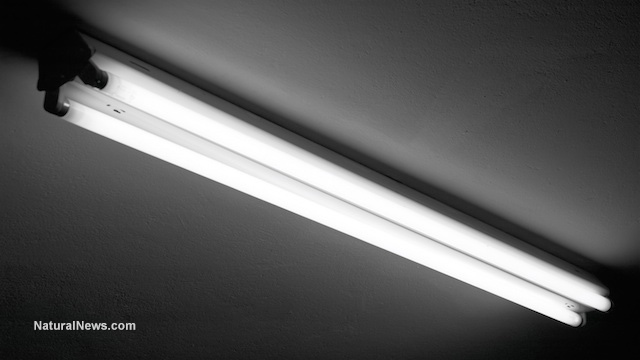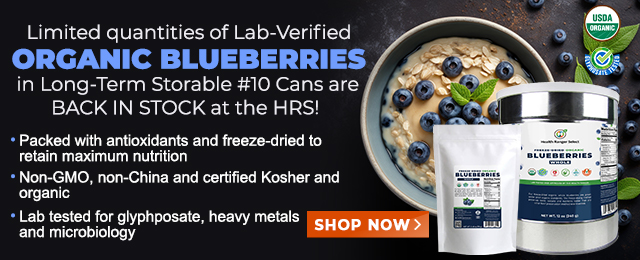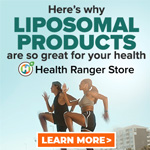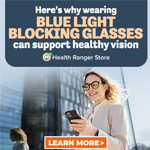Could artificial light be making you fat? Or even worse, giving you cancer?
Wednesday, February 24, 2016 by: David Gutierrez, staff writer
Tags: artificial light, cancer, obesity

(NaturalNews) Hormone changes caused by artificial light at night (ALAN) may be partially responsible for rising global rates of obesity and cancer, according to recent studies conducted by researchers from the University of Haifa, Israel, and published in the journals Chronobiology International and the International Journal of Obesity.
"This represents the first time that anyone has shown an association between obesity and light pollution on such a large scale," researcher Boris Portnov said.
Prior studies have shown that exposure to ALAN disrupts the body's circadian rhythms and causes changes to hormone levels. In particular, ALAN appears to suppress the production of melatonin, also known as the "darkness hormone." In humans with a healthy circadian rhythm, melatonin levels naturally fluctuate, with levels lowest during the day and highest at night.
Countries with the most light are also the fattest
Previous large-scale studies have connected disrupted day-night cycles – such as night shift work – with various health problems, but few of these have focused on the effect of ALAN in the absence of sleep disruption. Meanwhile, the studies to look at the connection of ALAN have all been small, but suggestive. For example, some animal studies have found that exposure to light at night causes a reduction in metabolism."In recent years there are a lot of studies that use ALAN as a proxy for different health issues including obesity," said researcher Nataliya Rybnikova. "Some lab studies have examined how ALAN leads to body-mass gain among mice."
The new study was designed to look for those changes on a larger scale, in human beings.
"Melatonin is responsible for metabolic function, and ALAN also influences metabolic function in people. So we decided to check if there is an association between ALAN and body-mass gain," she added.
The researchers used nighttime satellite images of more than 80 countries to collect data on average national exposure to ALAN. They then compared this information with national obesity rates. They found a strong connection, with 70 percent of countries with high-strength lighting also having the highest rates of obesity, even after adjusting for potential confounding factors including dietary patterns, gross domestic product, percent urban population and average birthrate.
The study was not set up to determine the reason for the correlation, but the researchers suggested that ALAN may produce behavioral or physiological changes that lead to unhealthy weight gain.
Nighttime lighting also causes cancer
The researchers then also performed a similar analysis, this time looking at differences in rates of breast cancer.Melatonin is known to possess antioxidant and anti-cancer properties, and night shift work has been linked to increased rates of cancer. Other studies by the University of Haifa researchers have shown higher rates of breast and prostate cancer in neighborhoods with higher levels of ALAN. Some of these findings are summarized in the 2013 book Light Pollution as a New Risk Factor for Breast and Prostate Cancers, authored by Portnov and co-researcher Abraham Haim.
The satellite analysis showed, as expected, that countries with higher ALAN levels also tended to have higher breast cancer rates. The connection was not as strong or consistent as it was for obesity, however. In some regions, particularly Western Europe, the connection between ALAN and breast cancer was very strong. Other regions, however, including Southeast Asia and the Persian Gulf, were characterized by "relatively low breast cancer rates against a backdrop of relatively high artificial light-at-night levels." This discrepancy suggests a potential area for further research.
The researchers also found that the quality of ALAN in the satellite photos had changed over the years. White light, such as that emitted by LEDs, has been increasing in prevalence. Disturbingly, this is the type of light most harmful to melatonin production.
Sources for this article include:
Breitbart.com
Haaretz.com
DailyMail.co.uk
Israel21c.org
Science.NaturalNews.com
Artificial light at FETCH.news
Get independent news alerts on natural cures, food lab tests, cannabis medicine, science, robotics, drones, privacy and more.
Take Action: Support Natural News by linking to this article from your website
Permalink to this article:
Embed article link: (copy HTML code below):
Reprinting this article:
Non-commercial use OK, cite NaturalNews.com with clickable link.
Follow Natural News on Facebook, Twitter, Google Plus, and Pinterest
- Newly released JFK files reveal Pentagon's role in creating Lyme disease and covid in the same lab
- The hidden dangers in your kitchen: How cooking methods impact diabetes, cancer and aging
- DEADLY DECEPTION: How COVID vaccines increased mortality rates and why authorities hid the truth
- CDC finally halts $11 billion COVID funding scam as health officials admit the ‘pandemic’ was a fraud
- Arkansas embraces medical freedom with landmark ivermectin law
- GAIN-OF-FUNCTION CAT-BIRD-FLU now on the rise as nearly a dozen cats in Colorado "test positive" for Bird Flu due to contaminated cat food
- Home gardening for preppers: A beginner's guide to growing your own food
- Lab leak confirmed? Boris Johnson's stunning reversal on COVID origins sparks global debate
- Unraveling the paradox: Why intelligent individuals fall prey to everyday blunders
- Cartels shift tactics: Kidnappings and organ trafficking surge as border crossings plummet under Trump policies
- Why you should think twice before buying mainstream toothpaste formulas
- Trump's greatest betrayal so far: Accelerating Middle East wars, silencing dissent, and serving Zionist masters
- Was JFK's assassination orchestrated by a CIA double agent? New evidence points to James Angleton as the “architect”
- Key nodes of Federal Government censorship
- ATTENTION PRESIDENT TRUMP: Please WITHDRAW your nomination of Dr. Susan Monarez for CDC Director as she is a VAX FANATIC and TOXIC JAB ZEALOT
- “Rent-a-womb” scandal: How China is exploiting U.S. birthright citizenship for long-term espionage
- Record honeybee deaths devastate U.S. agriculture, pesticides under scrutiny
- Speaker Johnson warns Congress may defund or disband rogue courts targeting Trump
- Newly released JFK files reveal Pentagon's role in creating Lyme disease and covid in the same lab
- Elon Musk: Aliens could be here on Earth RIGHT NOW
- Festive flavors: The sweet history, nutritional profile and health benefits of pecan pie
- Trump reverses course on Gaza plan, says “nobody is expelling Palestinians”
- Reclaim your health: How midlife exercise reverses years of inactivity
- Big Pharma's $8 Billion bribery scheme exposed: how doctors are pushed to prescribe junk science, not heal
- Boys are back in town: Trump’s patriotic alpha crew takes the wheel while toxic females ride in the backseat
- EPA advisor admits the agency is funneling billions to climate groups ahead of Trump’s return to White House
- Space war brewing? Russia threatens to destroy Starlink satellites
- Survival 101: Effective EMF blocking techniques
- A lack of integrity in Academia: Harvard professor found GUILTY of fraudulent research to promote CRT theory
- Mike Adams Sermon 66: God will DESTROY ISRAEL for its wickedness
- 5 Simple steps to boost your brainpower: How to strengthen executive function in a distracted world
- Rep. Nancy Mace introduces bill to ban biological males from female facilities on federal property
- Sugarcane extract superior to cholesterol-lowering drugs?
- WHO focusing more on policing speech about public health and implementing global surveillance systems
- Pilots report mysterious lights 'moving at extreme speeds' across Oregon skies
- Dr. Mike Yeadon releases 15-minute testimony - WATCH - about genocidal intent of COVID “vaccines”
- EPA advisor admits the agency is funneling billions to climate groups ahead of Trump’s return to White House
- The Health Ranger releases “Vaccine Zombie” song and music video, using AI-animated zombies for the music video
- California's social media censorship law struck down: A victory for free speech or a threat to online safety?
- Dr. Mike Yeadon releases 15-minute testimony - WATCH - about genocidal intent of COVID “vaccines”
- The pandemic as a tool for INDOCTRINATION: Understanding “The Indoctrinated Brain” by Dr. Michael Nehls
- Florida takes a stand: DeSantis proposes permanent ban on mRNA vaccine mandates
- Mike Adams releases country western hit single: Goin’ Back in Time is Comin’ Home
- Mike Adams releases music poetry sensation: A Child of God
- “Why we influenced the 2020 elections”: Facebook files reveal the coordinated effort to bury the Hunter Biden laptop story
- RFK Jr. clears key hurdle: Sen. Susan Collins backs controversial HHS nominee, signaling a new era for health policy
- Unpacking the Lies That We’ve Been Fed – new song and music video released by Mike Adams, the Health Ranger
- Mike Adams releases new song and music video: Nothing More Disgusting Than a Globalist
- Newly released JFK files reveal Pentagon's role in creating Lyme disease and covid in the same lab
- Congratulations to the FULLY UNVACCINATED as you resisted the COVID-19 PROPAGANDA MACHINE fueled by over $100 BILLION
- Michigan sheriff announces criminal investigation into 2020 election crimes, Dominion Voting Systems
- Israeli soldiers accused of even more torture and abuse in the West Bank
- Migrants are taking advantage of recent hurricanes to scam residents and loot their homes
- House Intelligence Committee calls for the ARREST and PROSECUTION of Dr. Anthony Fauci
- Red Cross issues warning to stop blood plasma donations from vaccinated people
- Scientists confirm: GENIUS brain function can be spontaneously unleashed in humans without any apparent cause
- EPA advisor admits the agency is funneling billions to climate groups ahead of Trump’s return to White House
- HYSSOP: What research reveals about the health benefits of this ancient holy herb
- Two containers with completed ballots fall out of truck in Florida
- Fully vaccinated about to see “tsunami” of illness and death, warns virologist
- Global leaders unite to clamp down on “misinformation” with UN-backed Cascais Declaration
- BREAKING: 2025 NDAA authorizes mandatory military draft of WOMEN across America… as Pentagon pursues global NUCLEAR war with both Russia and China at the same time
- Michael Yon warns of a ZIONIST TAKEOVER in Trump’s second administration
- BOMBSHELL: DNA testing kits are a SCAM to develop ethnic-specific bioweapons
- Ozempic and Wegovy weight loss drugs are injectable LIZARD VENOM PEPTIDES that may unleash a devastating wave of organ failure… side effects align with symptoms of SNAKE BITES
- Israeli soldiers accused of even more torture and abuse in the West Bank
- These 13 countries just signed an agreement to engineer a global FAMINE by destroying food supply
- NASA admits that climate change occurs because of changes in Earth’s solar orbit, and NOT because of SUVs and fossil fuels
- RFK Jr. clears key hurdle: Sen. Susan Collins backs controversial HHS nominee, signaling a new era for health policy
- Sermon 30: How Jesus reveals Caesar’s FAKE CURRENCY and FALSE AUTHORITY
- Coriander seeds: Ancient medicine backed by modern science
- Arizona officials claim Maricopa County needs 10-13 days to tabulate results of the election
Science News & Studies
Medicine News and Information
Food News & Studies
Health News & Studies
Herbs News & Information
Pollution News & Studies
Cancer News & Studies
Climate News & Studies
Survival News & Information
Gear News & Information
News covering technology, stocks, hackers, and more



"Big Tech and mainstream media are constantly trying to silence the independent voices that dare to bring you the truth about toxic food ingredients, dangerous medications and the failed, fraudulent science of the profit-driven medical establishment.
Email is one of the best ways to make sure you stay informed, without the censorship of the tech giants (Google, Apple, Facebook, Twitter, YouTube, etc.). Stay informed and you'll even likely learn information that may help save your own life."
–The Health Ranger, Mike Adams












































